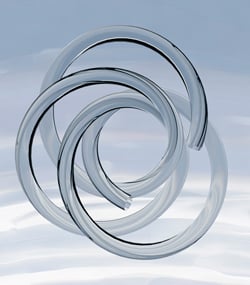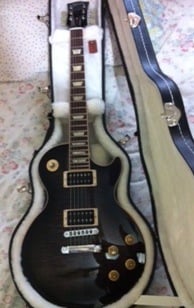| Author |
|
Toaster Mantis 
Forum Senior Member


Joined: April 12 2008
Location: Denmark
Status: Offline
Points: 5898
|
 Topic: Generation gaps in progressive music Topic: Generation gaps in progressive music
Posted: October 11 2014 at 16:01 |
|
I brought this up in the "What would you like to see discussed more?"
thread, but I think the subject deserves its own thread. I basically
wondered aloud whether the lack of discussion of newer bands that aren't
terribly informed by the 1960s/1970s prog-rock movement might have
something to do with the aesthetics and perhaps ethos/sensibility of
much music from the 1980s/1990s onwards coming across as too modern.
(for lack of a better word)
Speaking as someone from generation
1988, I listen to very little music from before the mid-1960s and even a
lot of 1970s or 1980s music there are some things about either the
aesthetics or the way things are put together conceptually I have to
more actively "suspend disbelief" about. In the entire concept of
avantgarde/progressive/experimental music there will simply have to be
some things that come across as cutting-edge and "out there" in ways
that won't by necessity age well or seem as avant-garde to future
generations. It's something I mentioned in another thread, can't
remember which one: The discussion turned to how for example Led Zeppelin and Pink Floyd were more popular with younger generations than Yes and I mentioned that Yes'
"lots of analog synthesizer + elfin vocals + new age religious lyrics +
cover art that looks like it could be spraypainted on the side of a
custom van" aesthetic screams "early 1970s" in a more obnoxious way than
LZ or PF's. Something like King Crimson's
mid-1970s heavy power trio line-up has less of a "kitsch factor" (not
sure if I'm using the K-word properly but you know what I mean), or
classic Genesis because of the entire retro-Victorian aesthetic or perhaps something like Captain Beefheart and Frank Zappa where the entire aesthetic's closely tied into the specific songwriter's "personal universe" more than a specific zeitgeist.
In a less obvious example, there is also how many of the very earliest progressive rock groups like The Moody Blues or Traffic
I don't find that interesting because while the "sound" is there the
narrative structures of the music aren't quite as involved as what Genesis, King Crimson
etc. would expand upon in half a generation. Which brings us to the
question of how much "aged well" is a question of "being imitated by
following generations": It's easier to find something like mid-'70s KC, or Rush
less dated when both would be a huge influence on the metal scene of
the 1980s and 1990s, or the Kosmische Musik movement respective to
Anglo-prog considering it foreshadowing both modern electronic music as
well as the more abstract corners of punk.
I'm also curious to
know if some of the younger posters coming here from the angle of
distinctively 1980s/1990s music styles (prog/tech metal,
math-rock/post-rock etc) feel this to an even more extreme degree than I
do? In metal circles I encounter people who have trouble getting into stuff from before some point in the 1980s or 1990s for instance, especially if they started with more extreme styles and hence kind of "read the genre's history backwards". I'm feeling a similar generation gap I'm on the wrong side of in
some other artistic media, like pre-1960s cinema or pre-WW1 literature
(pre-Hemingway even) though I'm trying to expand my horizons there.
|
|
"The past is not some static being, it is not a previous present, nor a present that has passed away; the past has its own dynamic being which is constantly renewed and renewing." - Claire Colebrook
|
 |
Friday13th 
Forum Senior Member


Joined: April 30 2013
Status: Offline
Points: 284
|
 Posted: October 11 2014 at 18:10 Posted: October 11 2014 at 18:10 |
|
I understand what you mean, but in the case of bands like Yes I think the "kitsch factor" is what attracts. I'm 20 and Yes is probably my second favorite next to KC. It's like "wow, only in the '70s could something this out there and awesome occur." To me it's the opposite. New bands like...sorry if I step on toes here...Porcupine Tree or Anathema, just don't cut it DUE to the fact that they're not kitsch in the sense that they're too polished and mundane like everyone else. Sure, Yes is considered geeky, but I'd take bizarre and colorful over crisp and sepia toned any day. I did start with Metallica for metal and Dream Theater for prog, though I did gravitate towards the formative bands quickly. One similar problem I noticed is of bands like Kraftwerk being ripped-off so hard over the years that their original sound is not nearly as impactful to newer generations as it must have been in the '70s.
Edited by Friday13th - October 11 2014 at 18:11
|
 |
sleeper 
Prog Reviewer


Joined: October 09 2005
Location: Entropia
Status: Offline
Points: 16449
|
 Posted: October 11 2014 at 18:15 Posted: October 11 2014 at 18:15 |
|
As a child of the mid 80's I guess I could say I span that gap. I didn't
properly get into music until I was nearly 17 with most of the popular
indie bands of the early 2000's (specifically Red Hot Chili Peppers,
Coldplay, Muse, Stereophonics etc) but within a year pretty much jumped
in head first to prog via Genesis and Pink Floyd on the classic side and
Dream Theater, Symphony X and The Mars Volta from the modern. I think
going in at both ends, with Marillion fleshing out the middle, right
from the start has meant has meant I gained an appreciation for the
aesthetics of both era's at the same time and as such, for a long time
I've been quite happy to listen to any prog music from any era. It's
true though that there are definitely bands with a sound that is so
heavily rooted in a certain time that they can date considerably, but
they may not always effect my enjoyment of a band.
That said,
I've certainly met several people from my generation who, despite being
very open to quite experimental music, can appreciate but don't
necessarily like bands from the 60's, 70's or 80's, and we've all seen
the "music died in 79" people that pop here from time to time. I think
in both cases a certain type of sound will click with them so completely
that it shuts out all others and can be said to be a more extreme form
of what it is that makes people like certain styles or genre's of music
in general. (Pure speculation here, based on the fact that liking music
is a genetic trait and that I assume that it's variations in this trait
that determines why people will like one type of music or another, or at
least be open to listening to various types of music).
One thing
I have noticed from the very small "population samples" I know of,
those of my generation that dislike older prog are far more likely to be
respectful towards the older music than old proggers who dislike the
modern takes on prog, some of which can be right b*****ds.
|
Spending more than I should on Prog since 2005 
|
 |
The Dark Elf 
Forum Senior Member


VIP Member
Joined: February 01 2011
Location: Michigan
Status: Offline
Points: 12702
|
 Posted: October 11 2014 at 20:28 Posted: October 11 2014 at 20:28 |
|
^ Get off my lawn!
|
|
...a vigorous circular motion hitherto unknown to the people of this area, but destined
to take the place of the mud shark in your mythology...
|
 |
Svetonio 
Forum Senior Member


Joined: September 20 2010
Location: Serbia
Status: Offline
Points: 10213
|
 Posted: October 11 2014 at 21:28 Posted: October 11 2014 at 21:28 |
I'm old and I was listening to progressive rock bands in the second half of the seventies when they still were in their heydays. Aside of a certain albums from the golden decade - I mean, the stunning albums who passed that time test although there are not really that much of the great albums from 70s as it maybe seems at first glance of a young person who discovers now all of these albums instantly and all together - our beloved genre is matured, in general, in passed decades. There's no doubt about it. Therefore the new bands are different from bands from the seventies, and I listen to them in a different way. Personally, I never fell into the trap of comparing these bigs of seventies with the best new bands of nineties, '00s and '10s.
|
 |
rogerthat 
Prog Reviewer

Joined: September 03 2006
Location: .
Status: Offline
Points: 9869
|
 Posted: October 11 2014 at 21:51 Posted: October 11 2014 at 21:51 |
I can relate to that statement more on account of meeting people who have that issue with older music. You are exactly right about extreme metal fans finding it tough to get into anything pre-1980. For them, that is the quintessential guitar tone and nothing else will do. I am personally too open minded to let that affect my tastes too much. So, for instance, I can see where you're coming from regarding Yes and do feel they or Deep Purple for that matter are a lot more 70s sounding than King Crimson or Blue Oyster Cult. But I never felt like I needed to make any conscious adjustment on that account. Well, I generally find most synth sounds not the most beautiful to listen to so whether it's 70s synths or 90s doesn't make much difference to me. For my taste, I actually like performers who used a more minimalist approach to the instrument like S Wonder or Johnny Greenwood or stuck to the piano like Kate Bush (in the 70s albums) or Fiona Apple. I can see that that sort of less is more approach is not particularly compatible with prog and I can live with that. The only decade with which I felt the aspect of the music being too much of its time was off putting was, predictably, the 80s. Rather than sounds, I am interested in a certain balance as between the instruments and drums got way too intrusive for many artists in the 80s. There, yes, I have rationalised to some extent in order to appreciate great musical ideas. I find Marillion's drums pretty intrusive that way but since the songs are great, I just overlook it.
In contemporary music, I have more often had to adjust to the way vocals are delivered now, in a more staid and sometimes deadpan way (S Wilson for example) without great emotional involvement and intensity. I realise that a lot of people like it this way now but not me. So, again, I adjust to that if the music is promising. But no, not any particular sounds that I dislike in the current era and adjust.
|
 |
HackettFan 
Forum Senior Member


Joined: June 20 2012
Location: Oklahoma
Status: Offline
Points: 7946
|
 Posted: October 11 2014 at 23:26 Posted: October 11 2014 at 23:26 |
|
I'm not as young as the OP is looking for. I think I understand the general point, though I'm confused by the particular examples in the OP. I stated it somewhere elsewhere that I don't think that the enormous impact of Crimson's ITCOCK is really felt if one was not able to discover it when it first came out, as I wasn't. I've also made the point in the past that Hackett's early two handed tapping suffers post-hoc from sounding a bit cliche, even though it's prior in several cases to Eddie Van Halen spreading it like wildfire to nearly every run-of-the-mill guitarist.
|
 |
Toaster Mantis 
Forum Senior Member


Joined: April 12 2008
Location: Denmark
Status: Offline
Points: 5898
|
 Posted: October 12 2014 at 02:56 Posted: October 12 2014 at 02:56 |
 Friday13th wrote: Friday13th wrote:
I understand what you
mean, but in the case of bands like Yes I think the "kitsch factor" is
what attracts. I'm 20 and Yes is probably my second favorite next to KC.
It's like "wow, only in the '70s could something this out there and
awesome occur." To me it's the opposite. New bands like...sorry if I
step on toes here...Porcupine Tree or Anathema, just don't cut it DUE to
the fact that they're not kitsch in the sense that they're too polished
and mundane like everyone else. Sure, Yes is considered geeky, but I'd
take bizarre and colorful over
crisp and sepia toned any day. I did start with Metallica for metal and
Dream Theater for prog, though I did gravitate towards the formative
bands quickly. |
Yeah, I'm aware I didn't use "kitsch" as properly defined in part because Yes
were among the bands to do that cosmic comic book-y New Age mystic
aesthetic first. Perhaps a better example of kitsch in that context
would be a lesser band clearly influenced by Yes such as Starcastle.
It's more that it's now regarded as extremely stereotypical of its era
and not in a positive way, because that aesthetic was meant to be very
progressive and avantgarde but for the exact same reasons comes across
as rather old-fashioned. I might have used the term "campy"
instead but that's not a negative. I'm referring more to why other
people might perceive it as kitschy. (I don't) There is of course also
something of a "they don't make it like that any more" appeal to certain
movements that are very much the product of a specific time and place
though, something that quite a few "retro" music groups might have
problems recapturing because the world's just a different place now. Funny that you mentioned Anathema, because I think their old gothic death/doom metal output is very distinctively 1990s.
 One similar problem I noticed is of bands like Kraftwerk
being ripped-off so hard over the years that their original sound is not
nearly as impactful to newer generations as it must have been in the
'70s One similar problem I noticed is of bands like Kraftwerk
being ripped-off so hard over the years that their original sound is not
nearly as impactful to newer generations as it must have been in the
'70s |
Now that you mention Kraftwerk, there is also a huge generation gap in the electronic music scene regarding pre- KW styles and artists. Most fans of modern electronic music I've met don't consider Tangerine Dream or Klaus Schulze
"real" electronic music as a result of being too closely rooted in
Krautrock and/or being too reliant on traditional instrumentation. Most
of the fellow KS/ TD fans I've met also approach them from a psychedelic or progressive rock angle... that or their connection to modern classical.
|
|
"The past is not some static being, it is not a previous present, nor a present that has passed away; the past has its own dynamic being which is constantly renewed and renewing." - Claire Colebrook
|
 |
Toaster Mantis 
Forum Senior Member


Joined: April 12 2008
Location: Denmark
Status: Offline
Points: 5898
|
 Posted: October 12 2014 at 03:11 Posted: October 12 2014 at 03:11 |
 sleeper wrote: sleeper wrote:
That said,
I've certainly met several people from my generation who, despite being
very open to quite experimental music, can appreciate but don't
necessarily like bands from the 60's, 70's or 80's, and we've all seen
the "music died in 79" people that pop here from time to time. I think
in both cases a certain type of sound will click with them so completely
that it shuts out all others and can be said to be a more extreme form
of what it is that makes people like certain styles or genre's of music
in general. (Pure speculation here, based on the fact that liking music
is a genetic trait and that I assume that it's variations in this trait
that determines why people will like one type of music or another, or at
least be open to listening to various types of music). |
Not
sure if music is purely a "genetic trait". I think your music taste, or
at least the rough outlines of your comfort zone, is shaped by what you
listen to during your formative years which would not just include what
you listen to of own free will but also your family and friends. I
sometimes wonder if I'm somewhat more open towards 1960s/1970s music
aesthetics than many my generation because my parents don't listen to
that much stuff from after the mid/late 1970s, for instance. Of
course, sometimes that's what you end up reacting against depending on
how much of a generation gap in the culture at large there is. There's
the entire question of how much musical generation gaps reflect those in
society overall, which I haven't really gotten into.
|
|
"The past is not some static being, it is not a previous present, nor a present that has passed away; the past has its own dynamic being which is constantly renewed and renewing." - Claire Colebrook
|
 |
Toaster Mantis 
Forum Senior Member


Joined: April 12 2008
Location: Denmark
Status: Offline
Points: 5898
|
 Posted: October 12 2014 at 05:23 Posted: October 12 2014 at 05:23 |
 rogerthat wrote: rogerthat wrote:
I can relate to that statement more on account of meeting people who have that issue with older music. You are exactly right about extreme metal fans finding it tough to get into anything pre-1980. For them, that is the quintessential guitar tone and nothing else will do. I am personally too open minded to let that affect my tastes too much. |
I think there are several generation gaps in metal: One between the "concrete rock" that still had one foot in hard blues rock and psychedelia on one hand, the other side of the gap being Judas Priest and the NWoBHM who were more self-conscious about belonging to a distinctive genre or "movement"; then there's one between those and the more extreme subgenres coming into their own in the mid/late 1980s; a third one setting in around the mid-1990s or so after most of the genre's main paradigm shifts have happened, there's a sharp drop-off in new "classic records" artists either deliberately set out to live up to or subvert after that. I've noticed that a lot of older metallers who came of age in the 1980s or early 1990s dislike most of what came out after some point in the mid-1990s. There might be a fourth one setting in somewhere in the 21st century where "post-metal" became a thing, and the overall subculture becomes less rigid in its identity or at least more fragmented. At least the genre's return to mainstream popularity around 2009 or so means that more and more people involved in the genre have an "outside looking in" perspective I didn't see very often in say 2004-2006.
 So, for instance, I can see where you're coming from regarding Yes and do feel they or Deep Purple for that matter are a lot more 70s sounding than King Crimson or Blue Oyster Cult. But I never felt like I needed to make any conscious adjustment on that account. Well, I generally find most synth sounds not the most beautiful to listen to so whether it's 70s synths or 90s doesn't make much difference to me. For my taste, I actually like performers who used a more minimalist approach to the instrument like S Wonder or Johnny Greenwood or stuck to the piano like Kate Bush (in the 70s albums) or Fiona Apple. I can see that that sort of less is more approach is not particularly compatible with prog and I can live with that. The only decade with which I felt the aspect of the music being too much of its time was off putting was, predictably, the 80s. Rather than sounds, I am interested in a certain balance as between the instruments and drums got way too intrusive for many artists in the 80s. There, yes, I have rationalised to some extent in order to appreciate great musical ideas. I find Marillion's drums pretty intrusive that way but since the songs are great, I just overlook it. So, for instance, I can see where you're coming from regarding Yes and do feel they or Deep Purple for that matter are a lot more 70s sounding than King Crimson or Blue Oyster Cult. But I never felt like I needed to make any conscious adjustment on that account. Well, I generally find most synth sounds not the most beautiful to listen to so whether it's 70s synths or 90s doesn't make much difference to me. For my taste, I actually like performers who used a more minimalist approach to the instrument like S Wonder or Johnny Greenwood or stuck to the piano like Kate Bush (in the 70s albums) or Fiona Apple. I can see that that sort of less is more approach is not particularly compatible with prog and I can live with that. The only decade with which I felt the aspect of the music being too much of its time was off putting was, predictably, the 80s. Rather than sounds, I am interested in a certain balance as between the instruments and drums got way too intrusive for many artists in the 80s. There, yes, I have rationalised to some extent in order to appreciate great musical ideas. I find Marillion's drums pretty intrusive that way but since the songs are great, I just overlook it. |
That is odd because I think Deep Purple's classic LPs sound less 1970s than Blue Öyster Cult, at least going by BÖC's first three LPs and the On Your Feet or on Your Knees live album since that's the ones I listen to the most. At least mk2 Deep Purple, from In Rock through Machine Head, sound like a pretty clear precursor to late-1970s/early-1980s heavy metal in a lot of regards especially if you also factor in Rainbow. In the case of BÖC they sound more like some weird hybrid between 1960s biker rock, proto-garage-punk (notice that Patti Smith contributed to writing several of their songs) and experimental psychedelia... there's quite a few key aspects of their signature style I haven't heard as many later metal groups pick up on as with DP. The other thing you mention is something I'm curious about, how much of music's alleged "datedness" is really hung up on production technology moreso than the content of the songwriting. There are definitely some instrumental sounds and approaches to sound engineering that were most popular in specific decades. In this case, datedness becomes a function of how much later generations take up an approach. Which brings us to another "listening to music history backwards" phenomenon I didn't mention in the OP, that being those people who get into 1960s/1970s avant/prog/psych but from a punk/new wave angle which I sometimes encounter in people who came of age in the late 1970s or the 1980s. There's more overlap between avant-prog/Krautrock and certain post-punk styles than between classic progressive rock. On one side: Beefheart, Can, Kraftwerk, Neu! etc. On the other: The Fall, Pére Ubu, Minutemen, Public Image Ltd., Sonic Youth etc.
Not to mention the influence of Syd Barrett-era Pink Floyd and Hawkwind on the spacier corners of new wave and gothic rock, which is perhaps less apparent except in artists with a very retro-psychedelic aesthetic. (The Soft Boys, The Teardrop Explodes etc)
Edited by Toaster Mantis - October 12 2014 at 07:21
|
|
"The past is not some static being, it is not a previous present, nor a present that has passed away; the past has its own dynamic being which is constantly renewed and renewing." - Claire Colebrook
|
 |
rogerthat 
Prog Reviewer

Joined: September 03 2006
Location: .
Status: Offline
Points: 9869
|
 Posted: October 12 2014 at 06:09 Posted: October 12 2014 at 06:09 |
 Toaster Mantis wrote: Toaster Mantis wrote:
I think there are several generation gaps in metal: One between the
"concrete rock" that still had one foot in hard blues rock and
psychedelia on one hand, the other side of the gap being Judas Priest and the NWoBHM who were more
self-consciously; then there's one between those and the more extreme subgenres
coming into their own in the mid/late 1980s; a third one setting in around the
mid-1990s or so after most of the genre's main paradigm shifts have happened,
there's a sharp drop-off in new "classic records" artists either
deliberately set out to live up to or support after that. I've noticed that a
lot of older metallers who came of age in the 1980s or early 1990s dislike most
of what came out after some point in the mid-1990s.
There might be a fourth one setting in somewhere in the 21st century where
"post-metal" became a thing, and the overall subculture becomes less
rigid in its identity or at least more fragmented. At least the genre's return
to mainstream popularity around 2009 or so means that more and more people
involved in the genre have an "outside looking in" perspective I
didn't see very often in say 2004-2006. |
Agreed again. There were reviews
in metal-archives which claimed that 'real metal' basically started with
Death's debut. I hope there is indeed a fourth post-metal wave.
I find some nice mixing of approaches in Mastodon. When I used to
listen to a lot of metal, I found the close mindedness of 'real metal' fans
ultimately suffocating and, as I lost interest in interacting with them, lost a
network of recommendations for good metal music. 
 Toaster Mantis wrote: Toaster Mantis wrote:
That is odd because I think Deep Purple's classic LPs sound
less 1970s than Blue Öyster Cult, at least going by BÖC's first three LPs and the On Your Feet or on
Your Knees live album since that's the ones I
listen to the most. At least mk2 Deep Purple, from In Rock through Machine Head, sound like a pretty
clear precursor to late-1970s/early-1980s heavy metal in a lot of regards
especially if you also factor in Rainbow. In the case of BÖC they sound more like some weird hybrid
between 1960s biker rock, proto-garage-punk (notice that Patti Smith
contributed to writing several of their songs) and experimental psychedelia...
there's quite a few key aspects of their signature style I haven't heard as
many later metal groups pick up on as with DP. |
I was thinking more
of their Don't Fear the Reaper and onwards phase, the one that's less
critically acclaimed but which I found more satisfying, barring Secret
Treaties. During that so called soft phase, BOC came up with some
beautiful melodies like In Thee, I love the night, Don't turn your back which
have stood the test of time. What I find very 70s about Purple is the
preponderance of organ, which got left out in the further evolution of
metal.
 Toaster Mantis wrote: Toaster Mantis wrote:
The other thing you mention is something I'm curious about, how much of music's
alleged "datedness" is really hung up on production technology moreso
than the content of the songwriting. There are definitely some instrumental
sounds and approaches to sound engineering that were most popular in specific
decades. In this case, datedness becomes a function of how much later
generations take up an approach. |
I think the production aspect is a very
big part of it because it was by using the studio artfully that the concept of
a rock/pop outfit really broke through in a big way. In the 90s, some
aspects of 80s production seem to have been abandoned and while the overall
sound was way fuller than in either 70s or 80s, the balance was closer to the
70s. That's why you have a lot more people complaining about 80s
production than 70s.
 Toaster Mantis wrote: Toaster Mantis wrote:
Which brings us to another "listening to music history backwards"
phenomenon I didn't mention in the OP, that being those people who get into
1960s/1970s avant/prog/psych but from a punk/new wave angle which I sometimes
encounter in people who came of age in the late 1970s or the 1980s. There's
more overlap between avant-prog/Krautrock and certain post-punk styles than
between classic progressive rock. On one side: Beefheart, Can, Kraftwerk, Neu! etc. On the other: The Fall, Pére Ubu, Minutemen, Public Image Ltd., Sonic Youth etc.
Not to mention the influence of Syd Barrett-era Pink Floyd and Hawkwind on the spacier corners of new wave and gothic rock, which is perhaps less
apparent except in artists with a very retro-psychedelic aesthetic. (The
Soft Boys, The Teardrop Explodes etc)
|
I cannot tell where youngsters with an
interest in classic 70s music are coming from. In my case, I was (and
still am) a huge fan of the Indian composer Ilayaraja who seems to have been
influenced by 70s rock (apart from classical music). So I took to prog
quite instinctively, with the exception of some bands like Gentle Giant that
took some time to 'get'. I loved tracks like CTTE or Firth right from the
first time I heard them. So I cannot personally relate to the experience
of those who had to warm up to Yes or Genesis over a period of time as that was
not my experience.
|
 |
MariusAA 
Forum Newbie


Joined: October 10 2007
Location: Portugal
Status: Offline
Points: 11
|
 Posted: October 14 2014 at 14:24 Posted: October 14 2014 at 14:24 |
 rogerthat wrote: rogerthat wrote:
I loved tracks like CTTE or Firth right from the first time I heard them.
|
This is extremely interesting in the assumption you're 25 years old not 50+. It is interesting because it hints that a great piece is timeless in any genre (even if somewhat dated by sound techniques).
|
 |
moshkito 
Forum Senior Member


Joined: January 04 2007
Location: Grok City
Status: Offline
Points: 16165
|
 Posted: October 14 2014 at 14:36 Posted: October 14 2014 at 14:36 |
 Toaster Mantis wrote: Toaster Mantis wrote:
... In metal circles I encounter people who have trouble getting into stuff from before some point in the 1980s or 1990s for instance, especially if they started with more extreme styles and hence kind of "read the genre's history backwards". I'm feeling a similar generation gap I'm on the wrong side of in some other artistic media, like pre-1960s cinema or pre-WW1 literature (pre-Hemingway even) though I'm trying to expand my horizons there. |
In the current King Crimson CD from their tour and in concert, they blew out a few times, and they can easily make metal circles sound like kids in the garage beating off!
Strange article for my ideas ... music is music and people are people, and we're making terms based on the fact that they wear this shoe made of leather 50 years ago, and shoes made of plastic today ... we're completely and totally ignoring the person and the artist, and this is my problem with the majority of the "metal circles" ... they are into a SOUND ... not into the music at all, or whatsoever.
I would like to suggest that you have to make a call to take the decision to define this theory of relativity in your mind, but not leave behind the rest of the world, or the rest of music out there regardless of what it is ... because, then it ain't no theory of nothing!
Edited by moshkito - October 14 2014 at 14:37
|
|
Music is not just for listening ... it is for LIVING ... you got to feel it to know what's it about! Not being told!
www.pedrosena.com
|
 |
SteveG 
Forum Senior Member


Joined: April 11 2014
Location: Kyiv In Spirit
Status: Offline
Points: 20503
|
 Posted: October 14 2014 at 14:41 Posted: October 14 2014 at 14:41 |
There's a lot to take in with post but what stuck out to me was the question of music sounding dated. Generally, as someone who's in his sixties, what sounds dated in music is usually some sonic gimmick that sounds kitsch to a particular era. Electronic drums, drum programming, and synth bass from the eighties to me are obvious examples, but early Moody Blues with their early psychedelics and mass over dubbing of Mellotrons (a particularly odd symph sound to begin with) would certainly also sound dated to me. Interestingly, music that does not sound dated, barring era specific recording techniques that I can distinguish, is very often acoustic based music with instruments like acoustic guitar, drums and piano. An early 1900's Martin guitar will sound the same if recorded by Ian Anderson in the seventies or the Fleet Foxes now. It's just that simple at times. The bottom line is, barring kitsch sonics tricks or era specific instruments and tones, is that this question is very subjective. So TM, what music sounds dated to you and why?
Edited by SteveG - October 14 2014 at 14:43
|
 |
MariusAA 
Forum Newbie


Joined: October 10 2007
Location: Portugal
Status: Offline
Points: 11
|
 Posted: October 14 2014 at 14:58 Posted: October 14 2014 at 14:58 |
|
Related story. Around 2000 I went to a Yes concert with a friend. We were on our fourties. I was surprised to find a lot of young people in the audience, leaning on the metalhead side by their looks. My friend explained it rather succintly to me: "They're here for Steve Howe."
|
 |
rogerthat 
Prog Reviewer

Joined: September 03 2006
Location: .
Status: Offline
Points: 9869
|
 Posted: October 14 2014 at 23:29 Posted: October 14 2014 at 23:29 |
 MariusAA wrote: MariusAA wrote:
 rogerthat wrote: rogerthat wrote:
I loved tracks like CTTE or Firth right from the first time I heard them.
|
This is extremely interesting in the assumption you're 25 years old not 50+.
It is interesting because it hints that a great piece is timeless in any genre (even if somewhat dated by sound techniques).
|
I am 29. Well, I am a bit of a subjectivist so I would not like to comment on whether my liking it immediately was because of its timelessness or because of some subjective, emotional association. But if you can round up a decent number of people in my age group who like a piece like Firth, it may indicate that it is indeed a classic, a timeless composition whose appeal transcends its epoch. And I think there are. Not huge numbers but certainly several youngsters who like compositions of these bands. Prog just lacks the publicity that it probably got in the 70s. I do believe, though, that with the slowing down of the pace of changes in popular music, the concept of a classic piece of rock/pop will begin to take root in music too, just as we've already had the concept of 'classics' in books for a very long time. There is still a belief in the mainstream that what is old is rotten by definition and that listeners should be compelled to follow the trends. In a few years, though, that may no longer be the case and people may become more open minded to music that's not current. Whether that is a good or a bad thing for the ongoing subsistence of music is another story.
|
 |
Toaster Mantis 
Forum Senior Member


Joined: April 12 2008
Location: Denmark
Status: Offline
Points: 5898
|
 Posted: October 15 2014 at 04:37 Posted: October 15 2014 at 04:37 |
 moshkito wrote: moshkito wrote:
In the current King Crimson CD from their tour and in concert, they blew out a few times, and they can easily make metal circles sound like kids in the garage beating off! |
That's probably because KC's mid-1970s power trio lineup pioneered that entire overtly abstract style of heavy guitar playing you'd later hear in not just modern death metal with Trey Azagthoth from Morbid Angel mentioning Robert Fripp as a main inspiration, but also the heavier end of post-rock with Russian Circles and Slint being the first examples that come to mind.
 Strange article for my ideas ... music is music and people are people, and we're making terms based on the fact that they wear this shoe made of leather 50 years ago, and shoes made of plastic today ... we're completely and totally ignoring the person and the artist, and this is my problem with the majority of the "metal circles" ... they are into a SOUND ... not into the music at all, or whatsoever. Strange article for my ideas ... music is music and people are people, and we're making terms based on the fact that they wear this shoe made of leather 50 years ago, and shoes made of plastic today ... we're completely and totally ignoring the person and the artist, and this is my problem with the majority of the "metal circles" ... they are into a SOUND ... not into the music at all, or whatsoever. |
See, now I don't quite grasp the theory behind what you're saying. If you were referring to the social subculture surrounding the scene taking importance over the music, I could understand that.
Are you perhaps meaning that a lot of people in metal approach music from how it fits into a pre-existing genre idiom rather than on the specific project's own terms? That I'd definitely agree with, but I'm not sure how the metal scene is any different from other music genres that also have a "cultural movement" social aspect to them.
|
|
"The past is not some static being, it is not a previous present, nor a present that has passed away; the past has its own dynamic being which is constantly renewed and renewing." - Claire Colebrook
|
 |
Toaster Mantis 
Forum Senior Member


Joined: April 12 2008
Location: Denmark
Status: Offline
Points: 5898
|
 Posted: October 15 2014 at 04:50 Posted: October 15 2014 at 04:50 |
 SteveG wrote: SteveG wrote:
The bottom line is, barring kitsch sonics tricks or era specific instruments and tones, is that this question is very subjective. So TM, what music sounds dated to you and why?
|
You already mentioned The Moody Blues as an example, whom I find dated for the same reason as you do. Maybe it does not help for me that before hearing them very much, I'd also heard a lot of King Crimson and ELP's early songs. They show a very strong Moody Blues influence, but the songwriting's overall structure and instrumental interplay are significantly more intricate so when I get around to hearing the previous link I find it less involving. I'm used to that sound being accompanied by composition somewhat less... poppy? Again, the specific analog synthesizer sounds and hyperactive playing I hear from both Keith Emerson and Rick Wakeman on ELP and Yes' classic records strike me as very 1970s in a way the more "church organ"-like sound the late Jon Lord used in Deep Purple at the same time didn't. Maybe it's just what I mentioned with those synthesizer sounds falling out of favour in the mid/late 1970s, only brought back for "retro" sounds.
|
|
"The past is not some static being, it is not a previous present, nor a present that has passed away; the past has its own dynamic being which is constantly renewed and renewing." - Claire Colebrook
|
 |
TheRollingOrange 
Forum Newbie


Joined: June 28 2014
Location: Sweden
Status: Offline
Points: 20
|
 Posted: October 15 2014 at 07:07 Posted: October 15 2014 at 07:07 |
I don't know if I'm answering this correctly, or even answering the question at all, but well, I'm just gonna rant a little. I'm 20 and I rarely listen to modern prog. And if I do, it's bands like Syd Arthur. But then I was brought up with classical music and I'm not really into heavier music (anymore) as I've found modern prog to be, but maybe I've just listened to the wrong stuff. Like, I loved Firth of Fifth from the first time I heard it a couple of years ago, the same with King Crimson (Discipline was the first album I heard by them). I don't think the older prog bands sound dated, the music feels 70's, yes, but it doesn't feel old, which I think a lot of 80's music do.
Modern prog just doesn't appeal to me in the same way. I want to like it, because I know it's really, really good but it's hard to get into for some reason?
Uh, this text maybe was a bit incoherent but I hope you get what I mean.
|
 |
Meltdowner 
Special Collaborator


Honorary Collaborator
Joined: June 25 2013
Location: Portugal
Status: Offline
Points: 10215
|
 Posted: October 15 2014 at 07:15 Posted: October 15 2014 at 07:15 |
 TheRollingOrange wrote: TheRollingOrange wrote:
I'm 20 and I rarely listen to modern prog. |
Me too!  I listened to many Neo Prog albums and I still can't like most of it: I don't know what I should feel when I'm listening to it  I listen to many recent albums that are not from that sub-genre though , specially RPI, there are some strong albums from the last few years. 
|
 |
/PAlogo_v2.gif)


